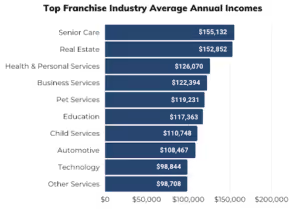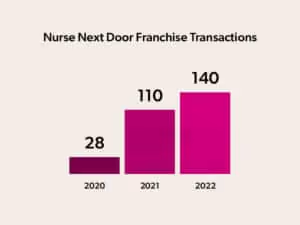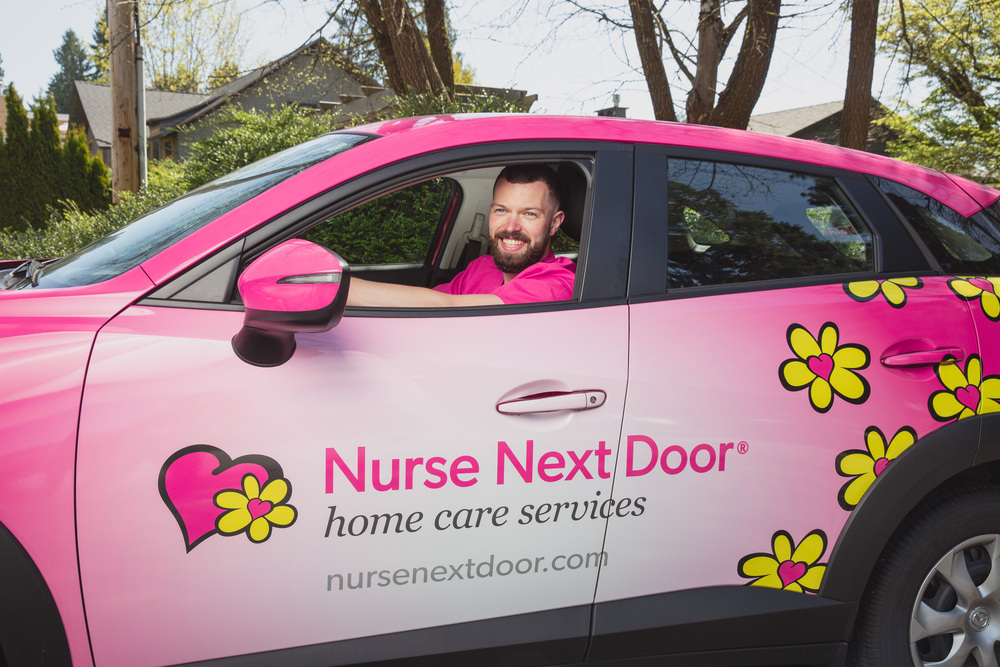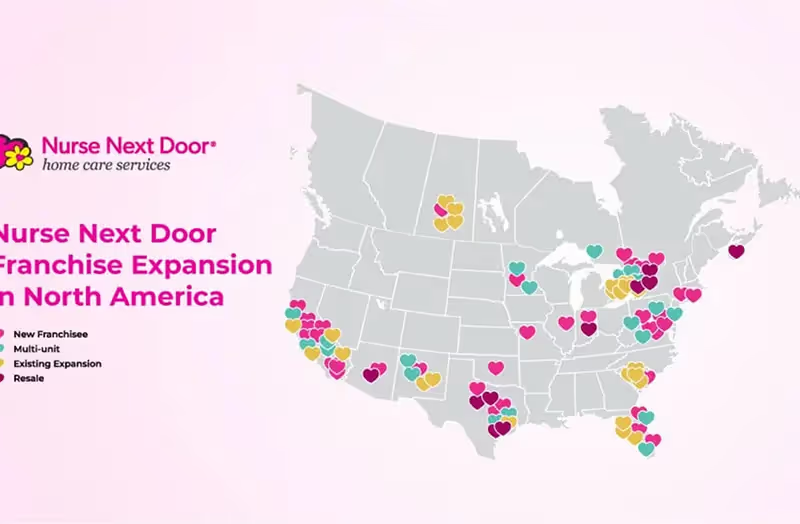
How Does Franchising Work? We've Answered the Top 10 Questions
Partnering with a franchisor is a great way to get started in the world of business ownership. Most people know running a successful business takes time and effort. But what if we told you you could skip some of those steps?
By joining a franchise, you gain access to a recognizable brand, proven systems, and other exclusive company benefits, allowing quicker access to business success.
OK, but how does franchising work? And what does a good franchise opportunity look like? We'll walk you through how the process works by answering the top 10 questions we get asked daily at Nurse Next Door.

10 Top Questions About How Franchising Works
- What is a franchise, and how does a franchise work?
- What is a franchise agreement?
- What should I know about franchise law?
- How does a franchisee make money?
- What are franchise fees?
- How much do you get paid for owning a franchise?
- What are the advantages of owning a franchise?
- What are the disadvantages of owning a franchise?
- How to choose a franchise?
- How do I become a franchise owner?
1. How does a franchise work?
Let's first define the two main parties involved in the franchise system:
- The Franchisee: They run the day-to-day operations and sell the goods or services.
- The Franchisor: The parent company that allows franchisees access to their products or services to sell under their brand.
Those two parties enter a joint business where the franchisor allows the franchisees to operate under the brand's name, trademarks, and existing business model in exchange for predetermined fees. Those fees include the following:
- Initial startup fee
- Licensing fee
- Ongoing royalties
By joining a franchise with an existing business model, you gain access to established inventory, marketing, advertising, training, ongoing business coaching, sales support, and a network of other franchise owners.
Essentially, it eliminates the trial and error period of setting up your own business, jumping you ahead a few steps in the business set-up process. This is a significant draw to both new and well-established entrepreneurs looking to expand their business portfolios with a path already laid out for them.
Access Your Welcome Package which includes
Discovery Video & 15 min overview of this opportunity
Franchisee Testimonials
The Nurse Next Door opportunity
Access to our calendar to book a 1:1 call.
2. What is a franchise agreement?
The franchise agreement is a legally binding contract between a prospective franchisee and a franchisor that outlines the roles, responsibilities, and commitments of all those involved. The number one franchise rule is: know what you're getting into.
The Federal Trade Commission (FTC) requires a franchise agreement to protect both parties and is standard practice in the industry as part of the pre-sale due diligence.
Franchise agreements can be a five to 30-year commitment, so it is essential to know what you are getting into when you sign the agreement.
Before deciding to purchase, you'll receive a franchise disclosure document outlining the following:
- The franchise's business background
- Legal Requirements
- Operational information
- The legal history of past litigation or bankruptcies
- Stakeholders, such as the franchise directors and any other main players
- Fees and costs of running the franchise
And, any other necessary information to help you decide if this franchise is right for you. Tip: Find yourself a good franchise attorney before you sign!
3. What should I know about franchise law?
Franchise laws are fundamental for safeguarding the industry for both franchisors and franchisees. Without them, individuals risk being taken advantage of and losing money and livelihoods. Fortunately, these laws are there to protect you.
At Nurse Next Door, we ensure our team is always up to date with the current franchise laws. Our team is happy to point potential franchise partners in the right direction so that you can discover what franchise laws are in your state.
Let's review the basic franchise laws in the United States and Canada.

United States
In the U.S., federal and state legislation oversees the franchise industry, with the Federal Franchise Rule being the primary law governing franchising enforced by the Federal Trade Commission.
Their primary goal is that the franchisor must provide a franchise disclosure document before the sale of the franchise. The federal government offers minimum obligations for franchising, but it is up to the individual states to create their own franchise laws. Many states require the franchisor to register their franchise disclosure document with the state before a franchise sale.
Discover what franchise laws are in your state!
Canada
Canada has yet to enact federal legislation around franchising. So, it is up to the individual provinces to do so, with only six provinces having franchise disclosure legislation:
- British Columbia
- Alberta
- Manitoba
- New Brunswick
- Ontario
- Prince Edward Island
The legislation aims to equalize the power imbalance between the franchisor and franchisee by giving franchisees more rights, such as:
- The franchisor must not withhold any information that could knowingly impede the franchisee's business or profits.
- Both the franchisor and the franchisee must act under the duty of good faith and fair dealing.
- Franchisees have the right to associate with other franchisees without interference.
Learn more about Canada's franchise laws and regulations here!

4. How does a franchise owner make money?
Like any business, a business owner will accept payment for the goods and services sold and deduct the operational expenses before collecting their personal salary. Therefore, the franchisee is paid based on their own franchise's success, the same as independent businesses.
The main difference with a franchise business is that the franchisee must also pay the franchisor's initial investment fees and ongoing royalties; however, the payoff for this is access to business coaching and training, which fast-tracks many franchise owners to higher annual salaries.
Franchises can be highly lucrative, which is why many entrepreneurs like this business venture.
Using home care as an example, there are five main revenue streams for making money:
- Private Pay is a primary revenue source for in-home care businesses. Many clients pay out-of-pocket as they have often planned ahead to ensure they can pay for care services as they age.
- The U.S. Department of Veterans Affairs (V.A.) offers veterans comprehensive healthcare benefits, including access to in-home care services.
- Medicare Advantage is an alternative to traditional Medicare. It is a supplementary plan that covers non-skilled in-home care.
- Hospitals, Doctor's offices, and frontline workers are an evergrowing and abundant resource for receiving client referrals, never underestimate the power of networking.
- Many insurance plans cover some or all of the costs of in-home care, making this a great source of revenue for in-home-care services.
5. What are franchise fees?
We touched on the franchise fees but let's dive in further. When a franchisee owns the right to sell products or services using the franchisor's brand, they agree to pay an initial franchise fee, advertising fees, and ongoing royalties.
Initial Franchise Fee
Most franchise businesses have a starting fee that covers the initial training program, marketing, branding, and other costs associated with starting a franchise location. For example, at Nurse Next Door, the minimum investment comes in at about $100,000 but can be started with as little as $30,000.
As a business owner, you'll also need enough cash to keep your operations afloat for at least one year. This might mean having enough money to pay for rent, office supplies, or employee salaries. These costs will vary depending on your geographic location.
Advertising Fees
A franchised business may be required to pay advertising fees. This means that the franchisor allocates advertising funds as part of its overall marketing strategy within the franchise relationship. Prospective franchisees would pay a portion of these advertising dollars to promote the franchised brand.
In return, franchise businesses get a lot of perks, like:
- On-hand business advice,
- An already set up I.T. system,
- Access to brand and marketing materials,
- Other valuable proprietary knowledge.
All these can be invaluable tools for new owners.
Ongoing Royalties
The business type you choose may include royalties to be paid to the franchisor based on a percentage of the income of your outlet. In the discovery process, ask for details about their royalty fees.
Discover the cost breakdown of investing in a home care franchise.
6. How much do you get paid for owning a franchise?
With all this talk of the costs of running a franchise, you may wonder, "but how much will I actually get paid to own a franchise?"
Unfortunately, there is not one single answer. Instead, there is a multitude of factors that can determine how much an individual franchisee will take home yearly. That could be the type of franchise business you've invested in, your particular store's location, and even unexpected business trends.
However, in a recent survey, senior care franchise owners are seeing annual incomes reaching $150,000 per year.
Wait, we have some good news!

Choose a franchise type with better profit margins, such as home health care, renovation, and real estate franchises. With good investment-to-profit ratios in those categories, more Franchise Partners can live with the financial freedom they have always dreamed of.
7. What are the advantages of owning a franchise?
Franchising should be beneficial for both the franchisor and the franchisee. Fortunately, there are many benefits for business owners who own franchises. The main advantages are:
- Finding clients who convert is fast-tracked, brand recognition goes a long way.
- You have a lot of room to grow and expand. Individual franchisees often turn a single location into multiple locations, like many Nurse Next Door Franchise Partners did!
- Access to business support, coaching, and peers, so you never have to feel like you're going it alone.
- Easier to secure financing from lenders with additional financing options.

8. What are the disadvantages of owning a franchise?
The idea of franchising can be very enticing, especially with advantages like those, but there are some disadvantages to be aware of.
Franchising may not be suited to you, especially if:
- You are a highly independent, lone-wolf type. When owning a franchise, you can run the business and test out innovative ideas, but the parent company decides on some aspects, like branding.
- You don't have access to capital or a good credit score. However, there are some investment costs, so you will need your own startup capital or a good credit score to receive loans.
- You are looking for a get-quick-rich business. While franchise businesses have a higher probability of success due to proven and tested business systems, you must also put in the work. Any business, franchise or not, requires perseverance, hard work, and passion for creating success.
9. How to choose a franchise?
With so many opportunities available in many industries, how do you choose one? Evaluating franchise opportunities is a critical step in the franchise ownership journey.
Choosing the right one can transform your life, so it's important to ask yourself many questions to inform your strategy and vision. Here are some relevant questions you should ask yourself:
What are you passionate about?
In our opinion, this is the number one question you need to ask. Different franchises require different skill levels, and it may not be a good fit if you don't enjoy your work. So think about what you bring to the table.
- Do you have strong people management skills?
- Are you an expert salesperson?
- Or do you prefer getting out into the field and meeting clients?
Then see whether your brand of choice would enable the work you enjoy.
Are there any services lacking in your community?
Some of the best ideas target a gap in the market. Take time to look around your community and see if there is a shortage. Look at local news, community bulletin boards, or Facebook groups to find that gap in your local area.
Is there anywhere to grab coffee at 8 am? Does your city's older population complain about the lack of care services.
If you keep a pulse on what's happening in your town or city, many opportunities can be had.

Does the franchise align with your values?
As an entrepreneur, you'll have to get used to wearing many hats. But no matter what your daily routine looks like, you should always feel a clear sense of purpose in your work.
Aligning your values with your franchise has a positive knock-on effect.
If your work adds meaning to your and your client's lives, you'll be more likely to be recognized for that work, attract talented and purpose-driven employees, and provide meaningful customer experiences
.In other words, you're more likely to run a successful operation if your whole heart is in it. At Nurse Next Door, we believe in the concept of Happier Aging, where we reconnect our clients with the hobbies and interests that make them happiest as they age.
Our Franchise Partners are people who are willing to go the extra mile to help seniors age comfortably because they care about the work they're doing and want every client interaction to exceed expectations. In return, Franchise Partners regularly express that they have finally found fulfillment in their careers.
Read a true Franchise Partner success story here!
10. How do I become a franchise owner?
To become a franchise business owner, you'll need to follow these steps:
- First, decide on the type of franchise that is right for YOU.
- Research, research, research! Discover your prospective industry and go through the franchise discovery process.
- Write a thorough business plan.
- Source funding.
- Review and sign the franchise agreement.
- Set up your business' infrastructure.
- Join the onboarding training sessions.
- Attend community and networking events to meet your franchisee peers.
- Finally, prepare for your opening day!
The road to becoming a franchise owner is challenging yet immensely rewarding. To learn a deeper understanding of how to become a franchise owner, check out our franchising guide!
Access Your Welcome Package which includes
Discovery Video & 15 min overview of this opportunity
Franchisee Testimonials
The Nurse Next Door opportunity
Access to our calendar to book a 1:1 call.
No Obligation Complimentary Call
Our Franchising Experts Have Answers to All of your Questions.
Recommended Reads

Why Nurse Next Door Is an Ideal Franchise Opportunity for Veterans
Explore why Nurse Next Door is a strong franchise opportunity for veterans, combining structure, leadership, and a mission-driven home care model.

Why Washington Is an Ideal Market for Purpose-Driven Home Care
Washington’s home care market is evolving as demand for aging-in-place continues to rise. Explore the opportunity, market dynamics, and what makes the right care model matter.

Why Nurse Next Door is One of the Best Home Care Franchises in 2026
Nurse Next Door is redefining what it means to own a home care franchise. Learn how our Happier Aging philosophy, 24/7 Care Services Center, and bold brand help owners build scalable, purpose-driven businesses in 2026 and beyond.
The Caring Journal
The Caring Journal is your go-to destination for stories, insights, and resources that celebrate the art and heart of caregiving.









